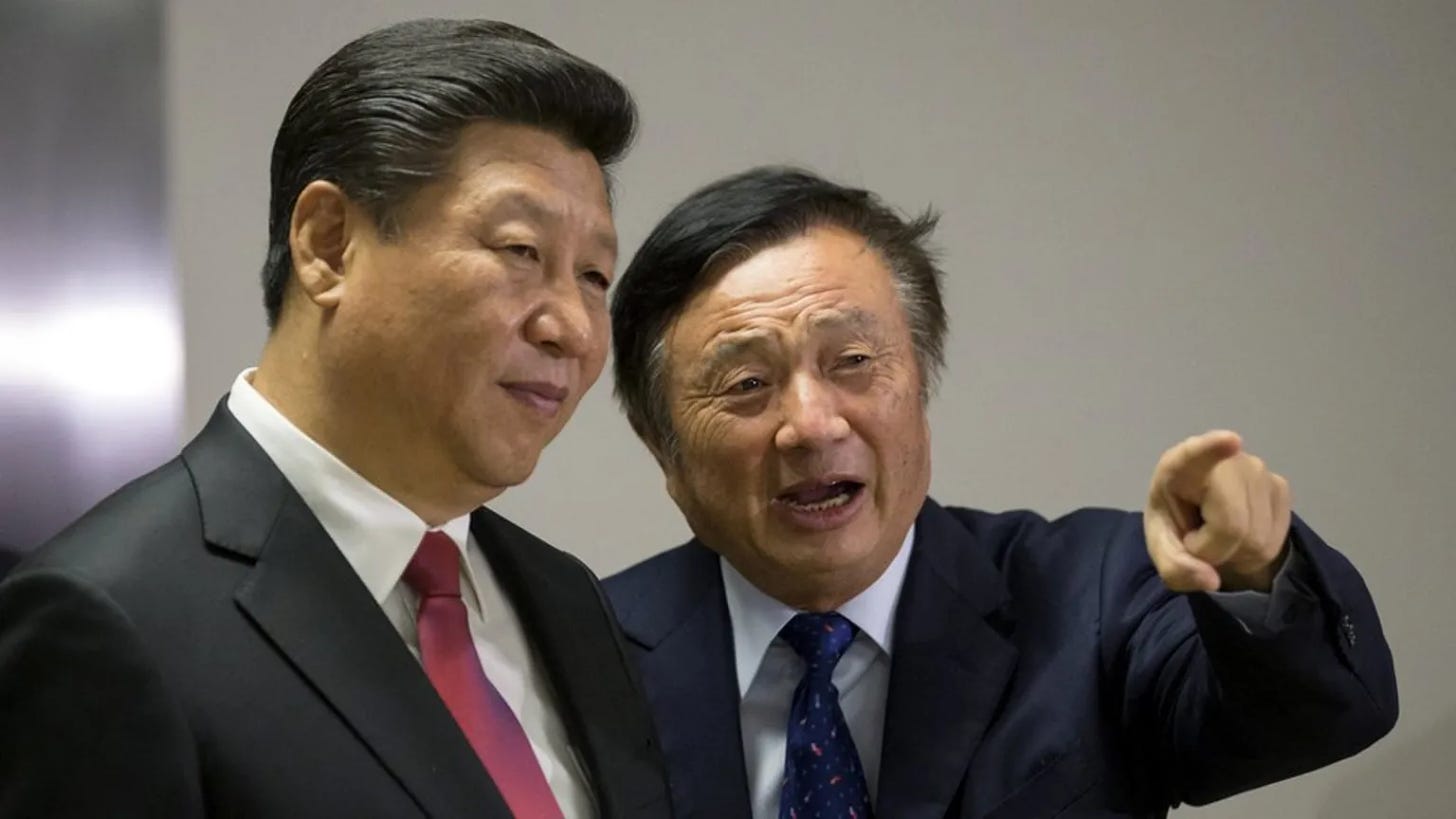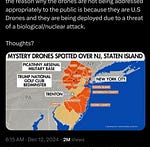The revelation from whistleblower Gary Berntsen paints a very disturbing picture of foreign interference in U.S. elections, with Huawei (China's largest telecommunications company) playing a central role — just as voters cast their votes in the 2024 elections. This Chinese tech giant, far from being just another corporation, is an extension of the Chinese government and military, posing significant national security risks to the United States.
HUAWEI HISTORY
Huawei's roots trace back to 1987 when Ren Zhengfei, a former officer in the People's Liberation Army (PLA), founded the company. From its inception, Huawei has maintained close ties with the Chinese government and military, receiving substantial support and resources.
Huawei's reach extends far beyond voting systems, however.
The company's rapid growth and global expansion have been fueled by these connections, allowing it to become a dominant force in telecommunications and consumer electronics.
The company's products are ubiquitous in cell phones, cell towers (of which I call Towering Trojan Horses), and various other devices across the United States.
The U.S. government's concerns about Huawei stem from the company's ties to the Chinese government and military, as well as the potential for backdoors or security vulnerabilities in Huawei equipment that could be exploited for espionage, cyberattacks, or worse, be weaponized. These concerns have led to a concerted effort to remove Huawei technology from U.S. networks and to discourage allies from adopting Huawei's 5G “solutions.”
HUAWEI’S ANTITRUST VIOLATIONS UP THE WAZOO
The U.S. government has long been concerned about Huawei's activities. In 2019, the company faced antitrust violations related to its smartphone business, leading to bans by major U.S. carriers like Verizon and AT&T. These actions reflect growing awareness of the security threats posed by Huawei's products.
In 2019 and 2020, the U.S. Department of Justice brought several antitrust-related charges against Huawei:
In January 2019, Huawei was charged with bank fraud, wire fraud, violations of sanctions against Iran, and conspiracy to obstruct justice. While not strictly antitrust violations, these charges were part of broader efforts to restrict Huawei's operations in the U.S.
In February 2020, the DOJ announced new charges against Huawei, including racketeering conspiracy and conspiracy to steal trade secrets. These charges that Huawei engaged in decades-long efforts to misappropriate intellectual property from U.S. companies.
The Federal Trade Commission (FTC) and several state attorneys general have also investigated Huawei for potential antitrust violations related to its smartphone business practices.
In May 2019, the U.S. Commerce Department added Huawei to its "Entity List," effectively banning U.S. companies from doing business with Huawei without special licenses. This action, while not an antitrust measure per se, significantly impacted Huawei's ability to operate in the U.S. market.
Huawei's deep connections to the Chinese Communist Party and the PLA are well-documented. The company has collaborated on research projects with PLA personnel in areas such as artificial intelligence and cybersecurity. This blurring of lines between civilian and military technology, known as "civil-military fusion," is a cornerstone of China's strategy to become a global superpower.
The implications of these revelations are profound. With Huawei's technology embedded in critical infrastructure and now potentially influencing election systems, the United States faces a multi-faceted national security threat. The company's products could serve as a backdoor for Chinese intelligence services to access sensitive information, manipulate communications, or even interfere with election processes.
THE DOMINION DOMINO
Berntsen's claims about Dominion Voting Systems and its links to Huawei servers in Belgrade and Hong Kong are extraordinarily alarming. If true, this would mean that critical U.S. election data is potentially accessible to Chinese intelligence services, giving them unprecedented influence over the American republic.
CHECK OUT THE TIMELINE FOR YOURSELF, HERE. THE HIJACKING OF U.S. ELECTIONS HAS BEEN A LONG TIME IN THE MAKING.
Based on Gary Berntsen's testimony, here's a breakdown of the Venezuelan source code transfer from 2003 to 2024:
2003: Venezuelan government creates Smartmatic and develops election software with a hidden ability to alter votes.
2005-2006: Smartmatic enters U.S. market, buys Sequoia Voting Systems.
2006-2007: Facing U.S. investigation, Smartmatic sells Sequoia but keeps its source code.
2010: Dominion Voting Systems buys Sequoia, gets license to use Smartmatic's source code.
2010-2024: Dominion uses this code in U.S. elections, including swing states.
Present day: Dominion allegedly stores U.S. voting data on servers in Belgrade, Serbia, linked to Chinese Huawei servers in Hong Kong.
Key points:
Venezuelan government allegedly owns the original source code.
Code passed from Smartmatic to Sequoia to Dominion.
Code designed to allow covert election manipulation.
U.S. voting data accessible to foreign entities.
On a side note, I can’t help but think about how Venezuela’s violent crime has plummeted recently because they have been emptying their prisons and sending those individuals to the U.S….. to vote illegally and create chaos in American cities.
But I digress……
THE INTERNATIONAL WEB OF ELECTION DECEIT
Berntsen’s testimony exposes a dark and sophisticated network involving the Venezuelan government, Chinese technology companies, and international criminal organizations.
According to Berntsen, the Cartel del Sol, a powerful transnational criminal organization led by Venezuelan officials, has stolen over $1.5 trillion from Venezuela's oil company and national treasury. This massive war chest has been used to influence elections and leaders in multiple countries including ours.
The most alarming claim centers on voting technology companies Smartmatic and Dominion Voting Systems. Berntsen asserts that Smartmatic was created at the direction of former Venezuelan dictator Hugo Chavez, with its source code designed to allow covert manipulation of election results. He alleges that this code is now used by Dominion, which manages elections in many U.S. swing states.
These claims represent a severe breach of U.S. national security and the integrity of its electoral system. Berntsen questions why U.S. intelligence — as in the DOJ, FBI, CISA, and the CIA — and law enforcement agencies haven't addressed these issues, suggesting a failure to defend American democracy.
When so much hangs in the balance the vulnerabilities in election technology will certainly sow serious discontent once election results come out. The involvement of foreign entities in critical U.S. infrastructure raises serious concerns about the security of future elections and the resilience of American democratic institutions.
Check out the Berntsen’s website, StolenElectionFacts, HERE.
MSM GETTING AHEAD OF ELECTION FRAUD
In the meantime, MSM reports these are all lies:
And here:
And here:
But these aren't lies….
Berntsen has made it abundantly clear that Huawei is not just a company – it's an arm of the Chinese state, wielding immense power and influence. The threat to U.S. national security and democratic integrity is real and immediate. Policymakers, security experts, and citizens should be working together to mitigate these risks and protect America's sovereignty in the digital age.
The involvement of Smartmatic, Dominion Voting Systems, and Huawei raises serious questions about the security of U.S. election infrastructure. With swing state voter information reportedly stored on servers in Belgrade and linked to systems in China, the threat to national security is imminent and severe. As Americans prepare to cast their votes in the 2024 elections, Berntsen's alarming claims demand immediate and thorough investigation by U.S. intelligence and law enforcement agencies. The future of free and fair elections in the United States will depend upon addressing these dire vulnerabilities and foreign influences in our voting systems.
If we fail to deal with this egregious breach, how can we possibly trust the election results?
If you find these interviews and articles informative, please become a paid subscriber for under 17¢ a day. I don’t believe in paywalls, but this is how I make a living, so any support is appreciated. Either way…. it’s available to you….





















Share this post